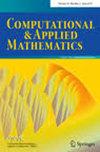结构化冲突约束下不可分割物品公平分配算法
IF 2.5
3区 数学
Q1 MATHEMATICS, APPLIED
引用次数: 0
摘要
摘要考虑了具有附加冲突约束的不可分割物品的公平分配问题。这些由冲突图表示,其中每个项目对应于图的一个顶点,图中的边表示不兼容的项目对,这些项目不应该分配给同一个代理。这种设置结合了P分割和I独立S集的问题,可以看作是冲突图的部分着色。在最终的优化问题中,每个代理都有自己的产品利润评估函数。我们的目标是使任何代理商获得的最低总利润最大化。在之前的一篇论文中,我们证明了这个问题对于一些众所周知的图类是强难的,例如二部图及其线形图。另一方面,证明了弦图、共比较图、双凸二部图和有界树宽图的伪多项式时间算法是存在的。在这篇文章中,我们通过开发伪多项式时间算法来扩展这条研究路线,这些算法解决了凸二部冲突图、有界团宽度图和有界树独立数图的问题。该算法基于动态规划,也允许完全多项式时间近似方案(FPTAS)。本文章由计算机程序翻译,如有差异,请以英文原文为准。
Fair allocation algorithms for indivisible items under structured conflict constraints
Abstract We consider the fair allocation of indivisible items to several agents with additional conflict constraints. These are represented by a conflict graph where each item corresponds to a vertex of the graph and edges in the graph represent incompatible pairs of items which should not be allocated to the same agent. This setting combines the issues of P artition and I ndependent S et and can be seen as a partial coloring of the conflict graph. In the resulting optimization problem, each agent has its own valuation function for the profits of the items. We aim at maximizing the lowest total profit obtained by any of the agents. In a previous paper, this problem was shown to be strongly -hard for several well-known graph classes, e.g., bipartite graphs and their line graphs. On the other hand, it was shown that pseudo-polynomial time algorithms exist for the classes of chordal graphs, cocomparability graphs, biconvex bipartite graphs, and graphs of bounded treewidth. In this contribution, we extend this line of research by developing pseudo-polynomial time algorithms that solve the problem for the class of convex bipartite conflict graphs, graphs of bounded clique-width, and graphs of bounded tree-independence number. The algorithms are based on dynamic programming and also permit fully polynomial-time approximation schemes (FPTAS).
求助全文
通过发布文献求助,成功后即可免费获取论文全文。
去求助
来源期刊

Computational & Applied Mathematics
Mathematics-Computational Mathematics
CiteScore
4.50
自引率
11.50%
发文量
352
审稿时长
>12 weeks
期刊介绍:
Computational & Applied Mathematics began to be published in 1981. This journal was conceived as the main scientific publication of SBMAC (Brazilian Society of Computational and Applied Mathematics).
The objective of the journal is the publication of original research in Applied and Computational Mathematics, with interfaces in Physics, Engineering, Chemistry, Biology, Operations Research, Statistics, Social Sciences and Economy. The journal has the usual quality standards of scientific international journals and we aim high level of contributions in terms of originality, depth and relevance.
 求助内容:
求助内容: 应助结果提醒方式:
应助结果提醒方式:


